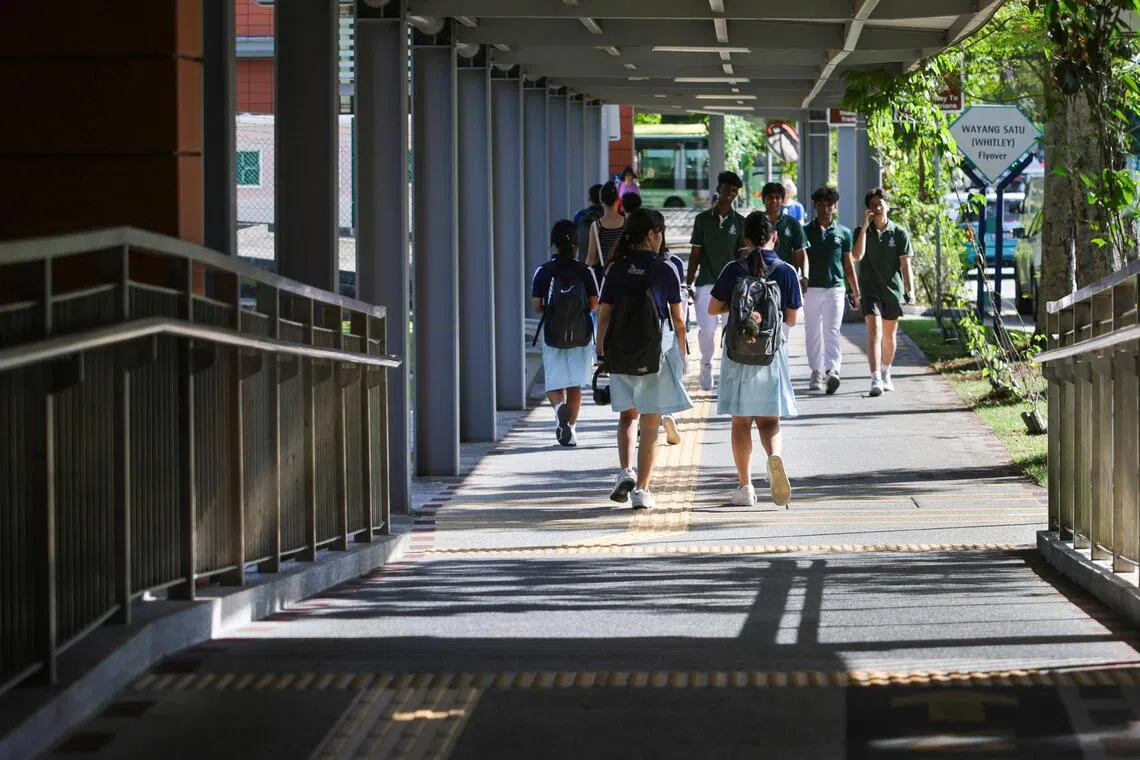All S’pore schools to run on MOE’s new central facilities management system by 2031
Sign up now: Get tips on how to help your child succeed

The new Smart Facilities Management system will manage day-to-day operations such as lighting, air-conditioning, and energy and water use.
ST PHOTO: GIN TAY
- By 2031, Singapore schools will adopt MOE's Smart Facilities Management (Smart FM) system for managing daily operations.
- The $78.6 million system, awarded to NCS Singapore, integrates existing infrastructure with GovTech's cloud for real-time monitoring.
- Smart FM aims to improve efficiency, sustainability and reduce manpower needs, but requires strong cybersecurity and regular maintenance.
AI generated
SINGAPORE - By 2031, all mainstream and special education schools in Singapore will move from managing their own facilities to a central system overseen by the Ministry of Education (MOE).
Schools will be connected to MOE’s new Smart Facilities Management (Smart FM) system, which will manage day-to-day operations such as lighting, air-conditioning, and energy and water use.
Rather than replacing existing infrastructure such as fire alarms, water tanks and pumps, or air-conditioning in server rooms, the system will integrate with them to provide a unified platform for monitoring and management across all schools.
The Smart FM system will also connect to the Government Technology Agency’s (GovTech) cloud service for real-time monitoring and control.
According to a tender seen by The Straits Times, the new platform will run in a centralised mode for 354 schools.
This means it can be hosted centrally, serving multiple schools at once through secure connections, with a centralised administrator overseeing user access and roles across the entire network.
MOE awarded the $78.6 million contract for the system’s provisioning and maintenance to tech firm NCS Singapore in March.
Dr Graham Ng, director of Nanyang Polytechnic’s School of Engineering, said a smart building increases efficiency as it can quickly detect issues like faults and ensure that equipment runs only when needed.
Overall, daily operations run smoother and faster, and are more cost-effective, he added. This system acts as the “brain”, which helps monitor and track how the building runs, he said.
In response to queries, MOE said on Sept 30 that Smart FM allows lighting and air-conditioning to be automatically or remotely adjusted based on occupancy, and will use energy and water meters to track and cut consumption.
Smart FM will also include a building management system that can detect faults in equipment such as fire protection and water supply systems.
“MOE will roll out these features to schools in phases from this year, depending on the readiness of their infrastructure and existing systems,” the ministry said, adding that all mainstream and special education schools will be equipped with these features by 2031.
These features will support the management of school facilities through automation and real-time reporting, said MOE. Data collected can be analysed for better planning of maintenance work.
The data will be fed into the Smart Space Application, GovTech’s cloud service, connecting school operations into a broader government digital ecosystem.
This shift is part of efforts to enhance productivity, efficiency and environmental sustainability in facilities management, said MOE.
“There are significant and mounting challenges in overseeing the infrastructure, building and facilities management of the schools,” the tender read. “These challenges include manpower constraints, ageing school infrastructure, and over-reliance on manual processes and an outdated system.”
Dr Ng said disruptions can occur if sensors or systems fail, and operations may face cyber-security risks due to internet connectivity.
“However, with proper maintenance, regular updates and strong cyber security, these risks are manageable, making the long-term efficiency, cost savings and sustainability benefits outweigh the challenges,” he said.
A consolidated system also frees up operations teams from routine manual tasks and allows them to make smarter decisions based on data insights, he added. For example, Dr Ng said building managers can adjust air-conditioning and lighting schedules based on actual room usage.
Introducing smart monitoring to schools that traditionally have not tracked energy, water, or waste use can transform how campuses operate and how people interact with the environment, Dr Ng said.
“By having real-time data and insights... it also helps engage students and staff, turning the school into a real-life case study for everyone to learn about sustainability, energy conservation and responsible resource use, thereby creating a culture of awareness and continuous improvement.”
The tech firm awarded this tender, NCS Singapore, is a Singtel Group subsidiary, which has worked with MOE since the early 2000s.
It supported the early implementation of the Schools Standard ICT Operating Environment (SSOE), which consolidated the management of information and communications technology (ICT) systems such as desktops and networks across schools.
In 2010, NCS was appointed the ICT partner for MOE’s $850 million SSOE programme.



